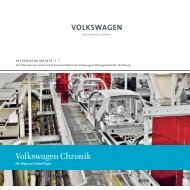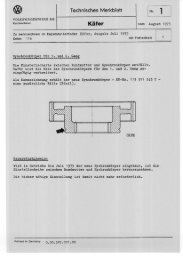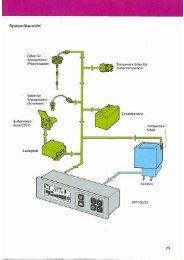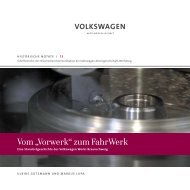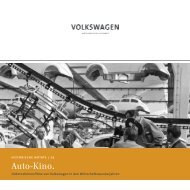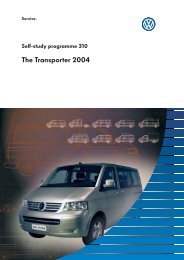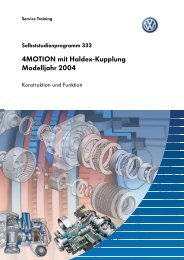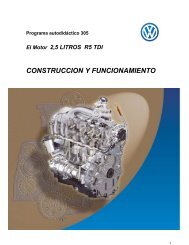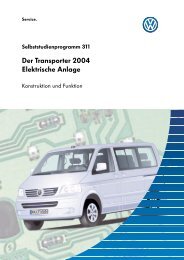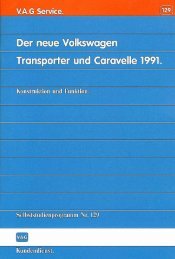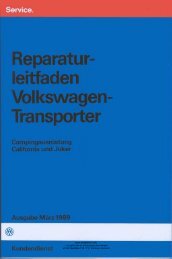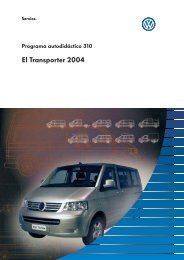HN 2: The British and their Works
HN 2: The British and their Works
HN 2: The British and their Works
Create successful ePaper yourself
Turn your PDF publications into a flip-book with our unique Google optimized e-Paper software.
At a discussion evening in the Volkswagenwerk on 3rd June 1947,<br />
Property Control Officer F. T. Neal raised the question of what<br />
legal form the company should take in future. He had shortly<br />
before been at Berlin headquarters, <strong>and</strong> learned there of<br />
the intention of placing the factory in the h<strong>and</strong>s of the German<br />
people. <strong>The</strong> proposal he himself submitted called for the<br />
management of the factory to be transferred to a managing<br />
board of trustees. <strong>The</strong>se should be responsible to a body made<br />
up of representatives of the highest government departments,<br />
the union, the state government, the banks <strong>and</strong> local govern-<br />
ment. 222<br />
4.3<br />
<strong>The</strong> transfer to German ownership<br />
This proposal of Neal’s more or less reflected the solution envisaged<br />
by the Property Control Branch, although in his inclusion<br />
of the banks <strong>and</strong> local government he went slightly<br />
beyond the model currently in favour. In the trust company to<br />
be set up, the state <strong>and</strong> the federal government should be represented,<br />
<strong>and</strong> in the supervisory board the unions <strong>and</strong> various<br />
state governments. <strong>The</strong> strict preference of the Property Control<br />
Branch for a public company was remarkable insofar as this<br />
amounted, to a certain extent, to a continuation of the original<br />
form of the company. <strong>The</strong>ir endeavour to make the Volkswagenwerk<br />
into a shining example of a democratically controlled<br />
industrial corporation, however, found no support at the<br />
Industry Division. Because the latter was averse to the socialistic<br />
aspect of the whole thing, the suggestion was blocked. 223<br />
It would probably have been simplest to have followed the letter<br />
of Directive 50, adopted in April 1947, <strong>and</strong> to have transferred the<br />
entire DAF assets to the appropriate state government, with the<br />
exception of assets belonging to a union, a trade association or<br />
a charitable association. But the Military Government excepted<br />
the Volkswagenwerk from this regulation, keeping control in<br />
<strong>their</strong> own h<strong>and</strong>s. One reason for this was the property rights<br />
claimed by the German unions. <strong>The</strong> "IG Metall" maintained that<br />
the German Labour Front had been set up with the confiscated<br />
assets of the unions which had been broken up in 1933. Although<br />
the directive offered grounds for doing so, the Military<br />
Government did not conclusively reject this claim. As with the<br />
subsequent transfer of the plant to the German federal government,<br />
it held the matter in suspense, but deflected the unions’<br />
claim for the time being. <strong>The</strong> claims of the former savers for the<br />
"Strength through Joy" car, who went to court dem<strong>and</strong>ing <strong>their</strong><br />
money or <strong>their</strong> cars, also went unredeemed, because the Control<br />
Commission for Germany feared that too early a verdict could<br />
bankrupt the company.<br />
A transfer of the factory to the government of Lower Saxony<br />
would have meant that the <strong>British</strong> could conveniently unload<br />
this problem. But with an eye to the potential economic power<br />
of the Volkswagenwerk they hesitated to take this course. In the<br />
h<strong>and</strong>s of a state government, the Property Control Division warned,<br />
it would be a dangerous weapon which could be directed<br />
against the victorious powers. Thus the military government<br />
maintained the status quo, until such time as the forthcoming<br />
establishment of a federal German government in 1949 started<br />
things moving again. In June the Property Control offered the<br />
state of Lower Saxony direct control over the Volkswagenwerk.



